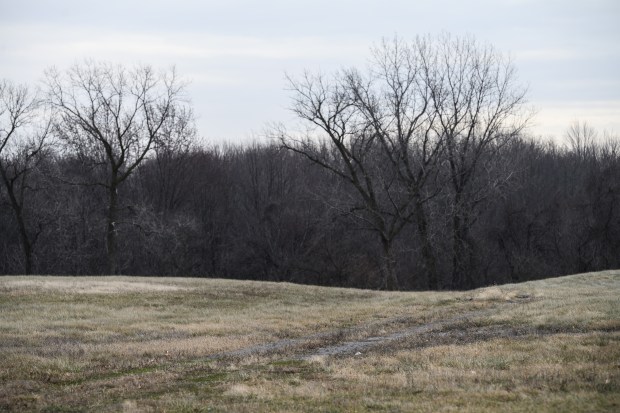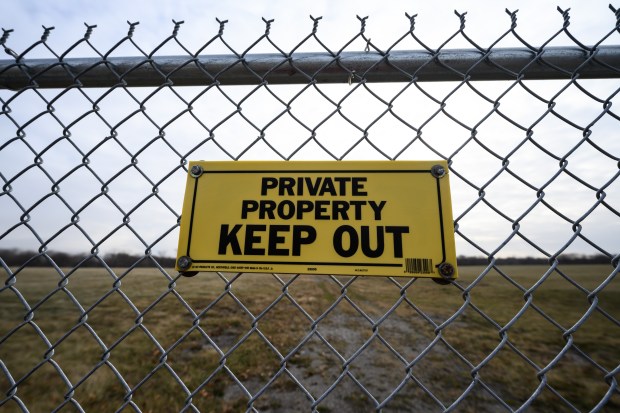For more than 20 years, Town of Pines residents have advocated for better coal ash regulations. Now, with national Environmental Protection Agency changes, some residents are concerned with what the future holds.
“I have a lot of mixed feelings,” said Cathi Murray, a Town of Pines resident and member of the People In Need of Environmental Safety community group. “I’m extremely, extremely sad about it, and not just so much for everything we’ve done, but what about future generations?”
On March 12, the EPA announced “swift actions” on its coal ash program, including faster actions on state permit program reviews and updates to coal ash regulations.
“Under President Trump’s leadership, EPA will advance cooperative federalism to allow states to lead the change on location issues, with federal support,” EPA Administrator Lee Zeldin said in a March 12 statement. “This is just one of many examples where this agency can and will work with our state partners to deliver for the American people.”
Zeldin also announced the “biggest deregulatory action in U.S. history,” according to a news release from the EPA. Deregulatory action includes reconsidering power plant regulations, vehicle regulations and terminating environmental justice and diversity, equity and inclusion within the agency.
“We are driving a dagger straight into the heart of climate change religion to drive down the cost of living for American families, unleash American energy, bring auto jobs back to the U.S. and more,” Zeldin said. “Alongside President Trump, we are living up to our promises to unleash American energy, lower costs for Americans, revitalize the American auto industry, and work hand-in-hand with our state partners to advance our shared mission.”
Residents and advocates have expressed concern with coal ash regulation changes, saying that it might set cleanup efforts back.
In an email to the Post-Tribune, a spokesperson for the EPA said coal ash regulations changes will not impact requirements at the Town of Pines site because “cleanup is not subject to a 2022 consent decree and 2023 unilateral administrative order for operable unit 1.”
“The cleanup associated with the Town of Pines site addresses impacts from coal combustion residuals … used as landscaping fill, as well as groundwater contamination associated with the disposal of CCRs,” the email said. “The site does not address a CCR legacy impoundment such as described in the CCR regulation.”
The Town of Pines has been contaminated by coal ash from a nearby landfill, which held more than 1 million tons of coal ash from NIPSCO’s Michigan City Generating Station. Coal ash is a byproduct that’s created primarily from burning coal in power plants, according to the EPA.
Coal ash contaminates groundwater and makes large amounts of land unavailable for development.
PINES, the town’s community group, formed in about 2003 when residents found heavy metals in their drinking wells. Members were concerned with heavy metal levels in their soil, particularly arsenic.
Although new coal ash regulations might not affect the Town of Pines directly, Murray still has concerns about the impact they will have nationwide.
“For me, it’s never been about the fact that we need to close down coal-burning power plants,” Murray said. “For me, it’s always been about finding a safe way to dispose of the toxic stuff that comes out of them. A safe way that doesn’t put people like me, my children and my community in danger.”
Paul Kysel, another Town of Pines resident and member of PINES, said actions taken by President Donald Trump’s administration and Gov. Mike Braun make him concerned about environmental justice.
Earlier this month, Braun signed two executive orders targeting the environment, including one to make state regulations consistent with national ones and another prohibiting the use of “environmental justice” in permitting, enforcement and grant decisions, according to Post-Tribune archives.
If federal regulations are less stringent, Indiana will be the same, Kysel said.
“I think it’s horrible to see our neighbors, particularly in the Town of Pines, suffer through what might be another very difficult four years,” he added.

In December, PINES began to apply for a Technical Assistance Plan grant, which allows community groups to retain services from an independent technical advisor to help interpret and understand technical site information, according to the EPA.
The grant PINES applied for was $50,000. Murray, on Monday, submitted the final draft for the application after the group was told they needed to provide more information.
PINES wants the grant to have a technical advisor because it’s difficult for all members to understand the science.
Murray doesn’t expect that TAP grant funds will be affected by Trump’s limit on spending, she said.
Kysel is worried that cleanup groups won’t be held accountable, although the EPA says coal ash cleanup standards won’t change in the Town of Pines. He thinks that they might end the cleanup, even if the coal ash is not gone.
“We’re still hoping to get the (TAP) funding,” Kysel said. “From that perspective, we’re hoping that our role will be extremely minimal going forward.”
mwilkins@chicagotribune.com




